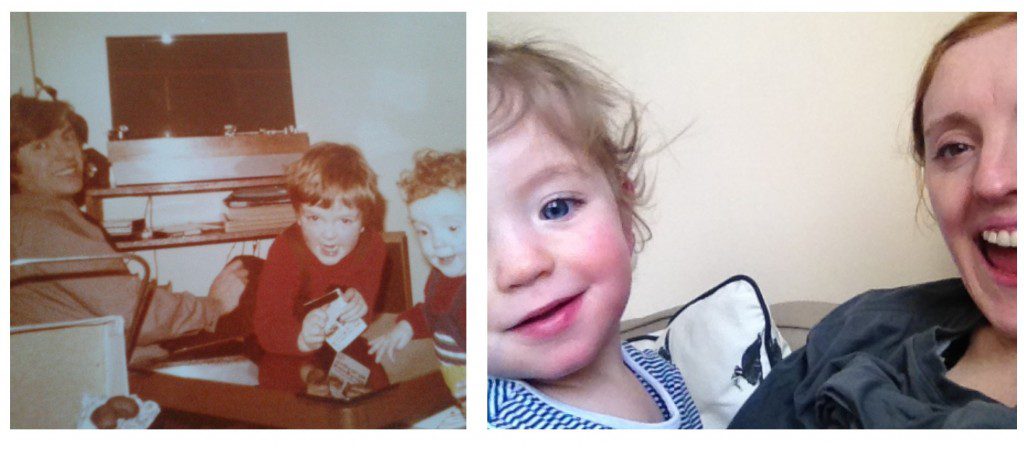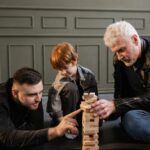Minding the generation gap – for Parkinson’s Awareness Week
 Photos: My Dad in the 80’s with me and my brother (I’m the one who looks like Orphan Annie) and then me and Eliza taken yesterday.
Photos: My Dad in the 80’s with me and my brother (I’m the one who looks like Orphan Annie) and then me and Eliza taken yesterday.
What’s it like to walk in Eliza’s shoes? It’s fresh, new, exciting. Everything in her path is something to investigate, from tiny toys to the big pieces of furniture she stumbles upon. Her world is an unlimited transport ticket, and she’s writing her own guidebook.
What’s it like to walk in her Grandad’s shoes? With a fuller passport, he’s more of a world-weary traveler. He much prefers the peace and quiet of walking along the pier to go fishing, rather than noisily tearing round the house, investigating minute particles of dust.
When it comes to talking about Parkinson’s to younger children, there are books available – such as this one that uses illustrations to describe the symptoms in a way that young children can understand – but they’re aimed at a slightly older age group. And for Eliza and my Dad, we’re looking at explaining one to the other, when the other’s only one. So how do you translate it into language someone so young can understand, when she’s only just started talking?
For us, at the moment, it’s about more simple interpretations. My Dad is completely fine in the morning, so that’s when we both speak to him more often; we have an ongoing date for a breakfast FaceTime, perching my iPhone in view of the high chair. And whenever we get to see my family, instead of chasing around after her, the two of them will sit together and he’ll sing made-up songs or make funny noises she loves.
Children aren’t burdened with the same prejudices and judgements of us jaded adults though, are they? She doesn’t know that it means something if he’s shaky, or still, or not as loud as Grandma at times (although Grandma is louder than most people!). And thinking about the things I remember about my Grandfathers, I don’t ever remember them being ill. I only remember the good parts; their kindness, how fun they were, the things they would do to make me and my brothers laugh.
So how do you explain a complicated neurological condition to someone who only just understands the smallest things? I’m not sure you even need to. My Dad will always be my Dad, who buys loads of good cheese and wine whenever we visit, tells me off for drinking, and answers the thousands of ridiculous questions I still always have about money and mortgages and grown-up things. And to Eliza? He’ll always be her Grandad.
I’m writing this in honour of Parkinson’s Awareness Week 2013, which runs from 15th-21st April. Find out more in my previous post, and on the Parkinson’s UK website (including what Harry Styles from One Direction, Gary Lineker, Jonathan Creek and my daughter have in common – clue: it’s to do with Grandads).
Make sure you check out Cherry Pie Lane, donating 10% of all sales this week, and doubling them, for marathon sponsorship in aid of Parkinson’s UK.
Parkinson’s UK is also one of the charities you can donate to by using Give as You Live.






3 Comments
Minding a generational gap – for Parkinson’s Awareness Week | LAB
February 23, 2015 at 11:53 pm
[…] Like this?Read more… […]
How to explain Parkinson’s to young children |
April 22, 2015 at 11:54 am
[…] such as Parkinson’s to toddlers and young children? It’s tricky, as I talked about earlier in the year. Especially when it’s something even adults struggle to come to terms […]
Being a rainbow in someone else’s cloud |
April 22, 2015 at 4:54 pm
[…] wrote a post on minding the generational gap a few years, as I don’t think children really notice things are ‘wrong’ – I […]